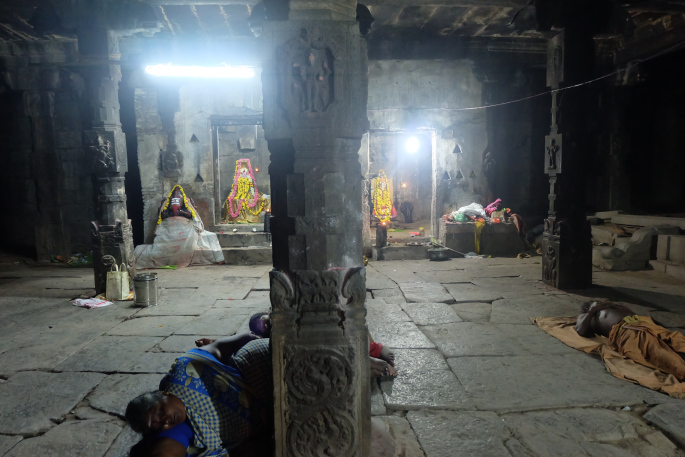Mahashivaratri, the annual night of Shiva, is just around the corner. The most important holiday in Hinduism. Here I report on my experiences during the celebrations from rural Tamil Nadu in Southern India. – Dennis Freischlad

Shiva Nights
I would have been lost.
My memory erased the 10 km that stretches between Tindivanam and the junction which turns a well paved road into a gray carpet of stones and dust. The headlights hit the villages of rural Tamil Nadu like spotlights on a never accentuated world. The festivities are on. Battering drums scar the night, the generators rumble and half naked men – covered in leaves, colors and giant clay bowls on their head – are being followed by hundreds of cheering and frantic people, worshippers of a raucous delight.
Mahashivaratri, the annual night of Shiva, is upon us.
The villagers eye our entourage with bold curiosity, dark boats shipping in a white sea of light. What are these people doing here? A vellakara (white man), a Gujarati woman and a Jamaican-looking dude on an Enfield who is, eversurprisingly to his fellow countryman, actually from West Bengal.
We push our bikes through the crowds, successfully discover an empty detour through the farther end of the village and park in front of one of the two temples we came to see.
I haven’t been here in the two years since my first and only visit. In my mind it became almost a mythological place, drawn by tenacious archetypes – a vague catalogue of sight and perceptions which I could not say for sure were personally experienced, daydreamingly fantasized or forever written in the collective subconscious of the human experience.
It doesn’t matter.
Our flip-flops slip from our feet.
We enter.
And I remember: When I came here for the first time, I thought I have been here before.
Its probably the most Indiana-Jones-like place I have ever seen in India. Situated on the edge of the village, the neglected temple seems to be as old as the first scriptures of man. What was build by humans is almost conquered by nature again: trees and bushes chew up the crumbling structure of man-made bricks and stones, and roots silently capture the crafted clay.
The daily Indian scent of humidity and incense, decay and flowers is in the air. We pass a beautiful dark and heavily greased Nandi and enter the main chamber, warm and comforting after an hour-long bike ride through a South Indian February night. One man and two fat women are sleeping on the floor and serve the gods as gentle guardians, possessing their own body in the same way they live in the hieroglyphics of their dreams.
Silently we walk and wander the thick musk of oil lamps, the garlanded gods and the food that is offered to them on the ever present banana leaves.
Just when time is about to cease, the man on the floor shrugs himself and awakes. As he sees us, he jumps up, rearranges his lungi and goes straight to work. The drunken priest grasps his bowl and neatly places a bell between his fingers. He mumbles his prayers, internalized like his very stream of blood and consciousness, and smears our foreheads with vibhuti as the sweat is resting on his cratered caliber nose.
The ceremony is rich and short.
Once we leave the room, he is equally succesful falling back to sleep.
Two minutes later, we wake him up. After we went to check the Shiva lingam in the back part of the temple, next to long forgotten chambers out of which bats flung upon our arrival, we found the rusty gate to the sanctum sanctorum locked.
The keys, baba, polema: the keys!
The priest comes with us, opens the lock, pushes the iron gate open and leaves us alone once more.
It’s Shiva and us.
We climb into the „womb“, named Garbhagrha in Sanskrit or Koruvarai in Tamil. Each Hindu-temple is precisely designed, stone by stone and syllable by syllable, to represent the cosmos and ones own body and being. It’s magnificently build to meet all inner framework: a two-fold hole through which one can meet oneself both in the absolute and relative manifestation. Here, in the lifeforming womb, everything is being created and inherently vested with the seed of change and death. As the Heart-Sutra puts it so perfectly:
Form is emptiness, emptiness is form.
We sit.
Out of the tiny black square in the ceiling a descending moonshine is neatly imagined. The silent yet vibrant tone of the lingam is mixed with the celebrations from the village, and just outside, the bats still hit the air.
A subtle jungle.
We sit, close our eyes and breath.
It is midnight as we leave the temple and start our ascent.
Our torchlights guide the way through plastic filled ponds and the steep steps which have been carved into the rock chip by chip. After ten minutes we reach the Shiva-temple on top of the hill and join the hundreds of devotees from the surrounding villages. Doti mischievously points to the improvised kitchen which is chaotically established at the entrance of the temple, nodding at me and the parcel of parottas which I brought all the way from Pondy. I might be a clumsy, badly organized person, but my caveman instincts still run as smooth as the waters of the Hindus river: wherever I go, I make sure me and my people won’t be cold or hungry.
I tug my parotta a little closer, a little safer.
After paying our respect to Shiva once more and without dining at the temple kitchen, we leave through the back entry and quickly find our home for the night. Only a hundred meters from the temple walls we spread our blankets around an old fire place that is probably as old as the earliest caves and calligraphies found on the hill: A 1300 years of human, earth and fire.
We are sitting on the very edge of the hill, overlooking several villages and the dark planes of this full-heartedly holy, heavy unholy land. That’s it. We place candle after candle, wrap us in our warmest clothes and do as Shiva suggests in the Puranas: stay awake the entire night, focused and with an upright vertebra.
Doti, who already spent last Mahashivaratri all vertical, sane and wake, is fast asleep – time for Samrat and me to spent a couple of hours talking about our lives, about certain enlightenment characteristics, women, the solar system above our feet, shitty people and being too lazy for jogging. Once we settled all those very important topics, we hear a new wave of chants from the temple flooding and drowning the land.
We sit, close our eyes and breath.
The great Poet Basavanna once wrote:
They say Shiva loves music;
No, he doesn’t.
They say Shiva loves the learned;
No, He doesn’t.
Ravana, who made wonderful music
did not lead a full life.
Brahma, who learnt all the Vedas,
had to lose his head.
Neither is he fond of music
Nor is he fond of the Vedas
Our good lord of kudala sangama,
is fond of devotion!
This is the night of devotion.
This night, the charge is high and the minds float tangibly.
Shiva, the Mahadeva, the first yogi, coincidentia oppositorum, Shiva the most adored and worshipped figure of the Hindu Pantheon. Shiva who was a man and transcended his being, representing the dance of being and non-being, of creation and destruction, life and death. Shiva the limitless, for all lifeforms developed from the endless body of life. Shiva is everywhere. His manifestations know no limits. He steps into your life in the form of a drunkard, the holy ascetic, the dancer, the poet, the rikshaw driver that screws you with everything he has, the arms of your lover and all the places beyond your future demise.
I relax my spine, pull it straight, relax.
Samrat’s eyes are beaming.
I don’t know what he is thinking, but in my personal experience, Shiva comes as daily demands. When life presents you it’s never-ceasing challenges, regardless of your personal likes or dislikes: what the fuck do you do? How do you handle the challenge of navigating yourself through life at any given minute, any unasked hour and the predetermined scope of days and aeons?
If you fail to accept those challenges, that precise failure, that not-knowing is the very distance that seperates the personal mind from Shiva-consciousness. Right there, faced with one’s own strength and weakness, you gain a pretty good idea where you stand; and that ground is, first of all, to cherish and then to overcome …. or not. To think that oneself – an animal living on a spinning piece of hot rock that rockets purposeless through space – has to by any means overcome the shortcomings of our nature is the first misstep which will hinder all possible overcoming.
No need to try so hard.
You can’t be anything else than Shiva anyway.
The last thing I can remember is looking at the clock.
4.38 am.
One hour later I wake up, completely covered in a blanket of dew. The light has just returned to our world and the sun is about to peak over the edge of our planet home. Samrat is sitting next to me, already upright and awake. I wake Doti out of her sleep. Silently she stands up, shakes her cold bones and joints and bathes in the same view as us.
Even the monkeys on the temple walls seem to take in the mist which softly covers the earth beneath us, a widespread ocean of land and light.
Even the monkeys stroll through the thousand layers of red, marking the sky.
Even the monkeys fancy the silence of a new born day.
They sit, close their eyes and breath.
